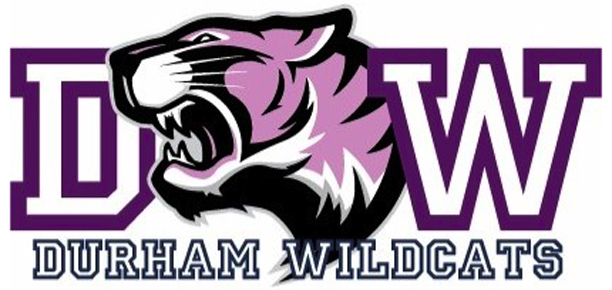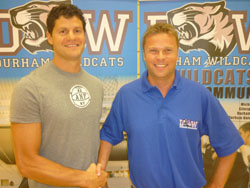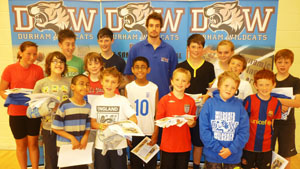Wildcats’ Meteoric Rise to the Top
Durham Wildcats’ recent inclusion as a BBL franchise caught many off guard. The announcement signaled the next step of a meteoric rise, culminating in professional status, which began in 2001 when Dave Elderkin was asked to help out with a group of lads that wanted to play basketball.
“The club initially grew out of a bunch of young players who, through their love of the game, were frustrated about their lack of opportunity to play” Dave explained, “and it just happened to include two of my boys.”
His sons, Mark and Paul Elderkin were just 15 and 13 at the time, and it became apparent pretty quickly that a higher level of competitive action was required. The Wildcats entered National League Division 4 in 2005, and after gaining promotion to Division 3, the first thoughts of a rise to the BBL began.
“I guess you could say that’s when the ambition started” Elderkin reflected, “the toughest league to get out of was Division 3; there were a lot of competitive clubs. ”
When in Division 3, the Wildcats partnered with Durham University, a relationship that has been mutually beneficial – with the Wildcats being able to use scholarships to bring in players and the university seeing their team promoted even more rapidly than the National League side.
“During the partnership with the Wildcats the student programme has gone from the third division up to the premiership, to being runners up this year. Obviously their rise up the ladder has been even more spectacular (than the National League side). When Durham University started introducing the scholarship programme, everything started to take real speed in terms of the BBL ambitions” continued Dave.
After one year in Division 2 (a short tenure which surprised even Elderkin), the Wildcats first season in Division 1 perhaps wasn’t quite as successful as they had envisaged, with the team going a mediocre 7-11 for a 7th place finish as well as only making it to the 3rd Round of the National Cup and Quarter-finals of the post-season Play-offs.
But, despite an unwanted spate of injuries, the team were competitive, and behind the scenes the Wildcats staff were putting all their effort into the step up to the pro league. With Durham County Council keen to emulate the success of the County Cricket Club and the BBL keen to remain at 12 teams next season, after the withdrawal of Worthing Thunder, now was the perfect time. “The present group of people that put the bid together have been together for quite some time. The first steps we took to move it forward as a BBL franchise were well over a year now.”
The most significant step has been Elderkin’s relationship with Quentin Sloper, head of Student Experience and Assistant Director of Sport at Durham University. One of the driving forces behind the transformation of sport at Durham University, Quentin has been “instrumental” to the BBL bid, taking on an ownership and chairmanship role completely outside of his remit at Durham University.
Sloper is clear that the business model has to change now they are a BBL franchise; partnership is at the heart of the club’s philosophy. The relationship with Durham University is now long standing with benefits for both parties. However, Sloper says, it is the support of Durham County Council which has enabled them to take the next big step; “The commitment from the Council has been outstanding and is a testament to their forward thinking and desire to support the development of high calibre sport within the County.”
In an effort to run within a cost effective budget from the start, almost the entire first year roster will be made up of students from Durham University, “a very good business model” according to Sloper. This means scholarships will be provided giving players free tuition, accommodation and players can balance their studies around basketball. As with the majority of other players in the BBL, players will be required to do a number of coaching hours in the community.
Wildcats currently have two full time members of staff, Dave himself, a former student at Durham University, and a senior operations manager, Chrissy Munro, also a former Durham University student, supported by “a good system of volunteers”. But they are looking to appoint two full time community coaches.
A big difference in the pro-league is 3 non-national spots as opposed to two. Elderkin says three have got their applications in to the university, two of which has been accepted, whilst the other is working through the system, all are NCAA division 1 players. “We’ve got 2 or 3 British players who are still undergrads, 2 British players completing their masters, and 2 graduating British students who we expect will still be involved in the programme, and we’ve recently announced the signing of Ralph Bucci.” he enthused.
What about the players from the EBL D1 side, are they really ready for the step up to the pro-league? Elderkin knows it will be a process because the standard in the BBL is that much higher, but thinks his players will be able to adjust, largely due to the extra practice time they will have. “I know it’s going to take time, my feet are firmly on the ground,” he stated. “I think with the extra training we can now put in to the programme, our players who were competitive in D1 without actually setting it alight will become good BBL players fairly quickly.”
Despite Durham not being a notable hotbed for hoops, the former PE teacher is confident that with the entrance of a BBL franchise they can be responsible for a surge in the growth of the sport in the area; “The last time Durham was a hotbed for basketball was in the early 70’s resulting in the berth of Sunderland Basketball Club, now playing as Newcastle Eagles. Durham University has very strong rugby, hockey, rowing and cricket programmes, all took time to establish. The BBL status will help us, the University and the County Council establish a strong basketball programme in the area.”
The community programmes are a key part of that, something that Quentin Sloper understands and places great emphasis on, with the long-term aim being to create a feeder system from the grassroots level all the way up to the professional. “It’s really important to us that over the next five years we’re producing our home-grown players and they’re coming through to us at Durham University” he continued, “I don’t think we’re in isolation now – the Eagles manage the Northumbria programme, Worcester and Plymouth are good working models, and there’s clearly a lot of activity now linking the Riders and Loughborough.”
Crowds in Division 1 last season varied from 150-500 per game, numbers Sloper isn’t particularly worried about and attributes to a lack of resources to market them effectively. “We’ve set ourselves the target of 600 for every game in our first season, now we’re in a situation with structural change.” That structural change, is their entrance as part of the Durham Wildcats Sporting Club – a collective of elite level sports teams including basketball, women and men’s volleyball, netball and women’s football in the area that will pool resources. “It gives us shared resources in terms of manpower and gives us to access to some really good performers in the Durham Business School. For the first time we’ll have a consistent approach to marketing games.”
The Wildcats no doubt have big aspirations, and despite many perhaps thinking Sloper and Elderkin are extremely optimistic in their outlook, few can count out a franchise that already has achieved what few would believe possible a few years ago.






2 Comments